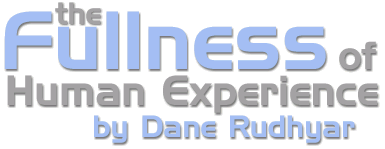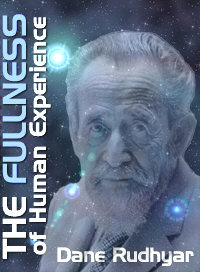 |
| Home | Bio | Art | Music | Literature | Civilization & Culture | Philosophy of Wholeness | Theosophy & Spirituality | Astrology |

CHAPTER SEVEN
A New Frame of Reference: The Earth-being & the Function of Humanity within It - 3 B: Transcendental and abstract frames of reference The vitalistic and the transcendentally religious frame of reference became radically transformed when the concept and the practice of measurement, as well as various analytical processes, were given a place of fundamental importance in culture. Numbers and the simple use of measures in transactions were known long before the classical age of Greece, but a knowledge of the structural meaning of Numbers was considered sacred and reserved to initiate members of "occult Brotherhoods." The men who became known in Greece as Chaldeans were probably not an ethnic group, but members of such Brotherhoods; only at a later time did their name refer to their degenerated followers. Pythagoras probably studied in Chaldean and Egyptian sanctuaries, and there learned most of what he made relatively public in his Krotona school as a knowledge to be imparted only to long-tested applicants who had proven their ability to use the knowledge constructively. By identifying the successive vocal tones of a magical (Le. vitalistic) incantation with a series of measurable lengths of vibrating strings, Pythagoras at least appeared to reduce the tone-quality of a sound to a quantitative value — a number of vibrations per second (the sound's frequency). Numbers, however, did not originally refer only to the counting of "how many" entities or factors were being experienced. Numbers had of themselves a profound meaning as principles of organization; one might say a holistic meaning. The number of factors in a situation, and of phases in a complete process, was in itself significant, irrespective of what the factors or phases were. This meaning could be referred to inherent characteristics of the human mind understood as a universal formative principle; but number deals with the relatedness of everything to everything else. It is implied in the concept of order. The act of measuring constitutes an analytical approach to such a concept. At a vitalistic and holistic level of conceptualization, however, the type of order being studied in analytical processes and in basic measurements is the functional interaction of parts within a whole system. Numbers originally have a functional character. As they become intellectual entities with which the mind can play, regardless of any experienceable reality in an existential field in which a human person may consistently operate, numbers cease to have meaning in terms of human reality. Yet as products of the rational activity of the human mind, they belong to a new frame of reference which, since the days of ancient Greece, has made "Reason" the supreme principle of organization. The application of this principle to causal sequences of statements or operative processes is "logic." Mathematics and algebra have been developed as special languages to interpret not only experienceable changes but the logical possibility of events in situations no human consciousness could possibly experience, even if the human intellect could imagine them. Logical reasoning and mathematical equations indicate only the possibility of such non-experienceable, non-human situations, in terms of the now generally accepted new frame of reference; yet most scientists claim that what is possible is "real" It is real in an abstract sense; but abstraction is confused with universality. The concept of universality did not belong to the animistic interpretation or even to the early vitalistic levels of human experience, because experience had then a local character. It referred to the responses of an integrated group of human beings to an at least relatively finite field of possible common activity. Travel, commerce, and intertribal marriage extended that field, as did the concept of an area of organized and integrated activity including all human beings and all their possible experiences. Though beyond local situations and experiences, this field came to be understood as a transcendent reality and not merely an abstract possibility. Greek culture and its diffusion by Alexander's conquests used and glorified Reason as builder of a universally valid frame of reference. But in order to be universally valid it had to transcend the concreteness of experiences conditioned by local features. While the great religious movements of India had given a divine character to locality-transcending experiences, the scientific approach of the leaders of Greek culture operated in terms of abstract statements. These became rigorously formalized during the European classical age. Abstract formulations in mathematical terms provided not only data of apparently universal validity, but a reliable foundation for the control of material transformations. At first these proved to be extremely valuable in insuring greater comfort and better chances of survival The ability to control became, and today is usually considered, the most glorious characteristic of the human condition. Such an ability nevertheless requires for its operation a definite set of limiting factors. Mankind is now beginning to realize the potential danger of the universal-abstract frame of reference, accepted by an ever-increasing mass of human beings who are unfortunately still dominated by, if not geographically local, at least doctrinally and emotionally divisive religions and cultures. The deepest implications of the worldwide crisis humanity is now facing is that a new frame of reference is needed which can be experienced as a concrete reality. The term concrete, however, should be given a broader than physical meaning. The new frame of reference should not only be "planetary" in a geographical sense: it should refer to a being, the Earth-being. By permission of Leyla Rudhyar Hill Copyright © 1986 by Leyla Rudhyar Hill All Rights Reserved.  Web design and all data, text and graphics appearing on this site are protected by US and International Copyright and are not to be reproduced, distributed, circulated, offered for sale, or given away, in any form, by any means, electronic or conventional. See Notices for full copyright statement and conditions of use. Web design copyright © 2000-2004 by Michael R. Meyer. All Rights Reserved. |
 |
